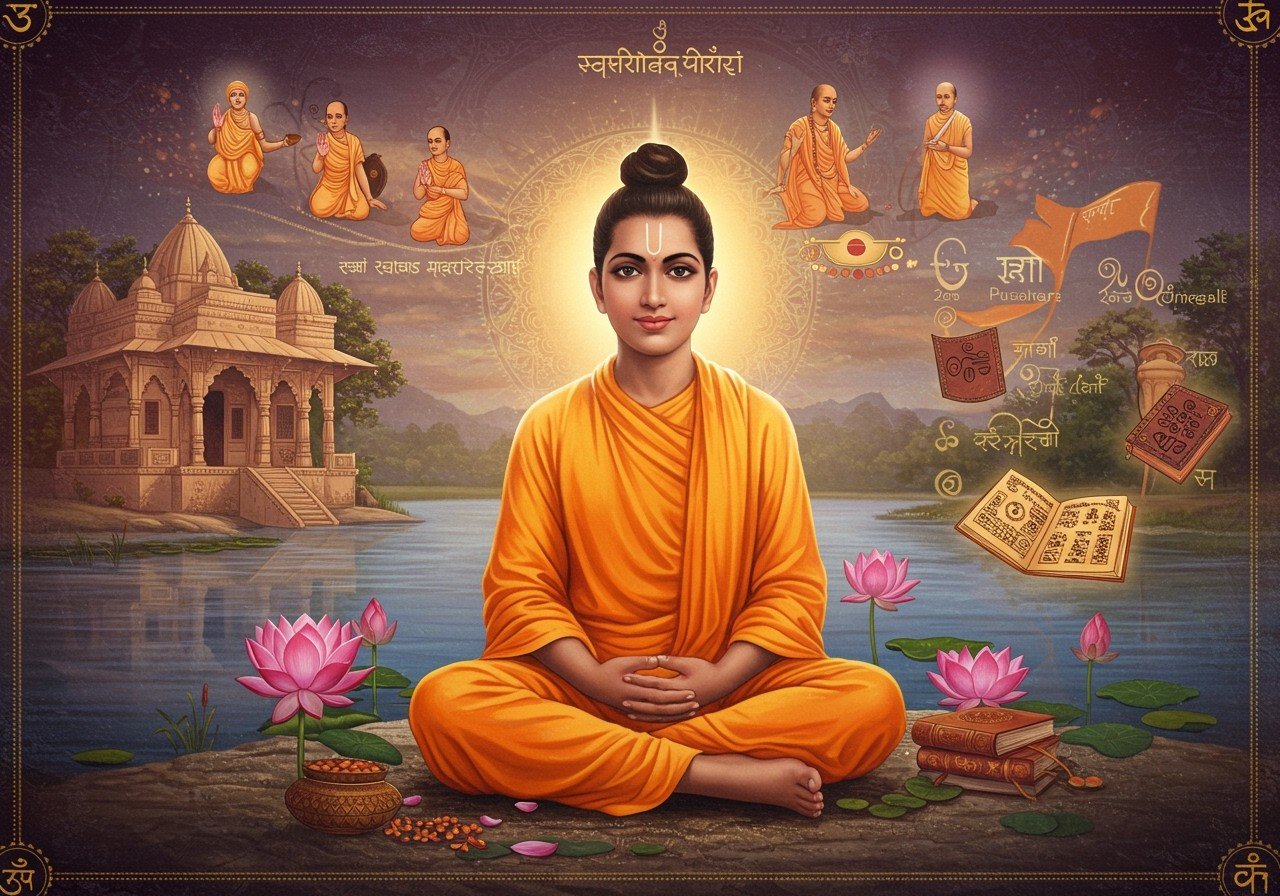
Exploring the life of Dayananda Saraswati reveals a journey of profound spiritual transformation and reform. Born on October 30, 1824, in 19th-century India, his ideas marked a significant shift from traditional norms. Understanding his life helps us appreciate his relentless efforts to revive Vedic traditions and his lasting impact on Indian society. Let’s delve into the life of this remarkable figure who championed truth, righteousness, and social justice.
Birthplace and Early Life
Dayananda Saraswati, originally named Mool Shankar Tiwari, was born in Tankara, Gujarat. Growing up in a devout Brahmin family, his father, a tax collector, instilled in him a deep reverence for Hindu traditions. Young Dayananda was immersed in religious practices and received a thorough education in Sanskrit and Vedic scriptures, laying the groundwork for his future spiritual pursuits. These early influences profoundly shaped his understanding of dharma and ignited a quest for deeper spiritual meaning. A pivotal moment in his childhood, witnessing the death of his sister and uncle from cholera, intensified his contemplation of life, death, and the pursuit of truth.
Spiritual Awakening and Renunciation
Dayananda’s spiritual awakening came during a Shivaratri festival. Observing a mouse defile a Shiva idol, he questioned the efficacy of idol worship. This profound realization became a turning point, propelling him on a quest to rediscover the true essence of Hinduism within the Vedas. At the young age of 21, he renounced worldly attachments and embarked on a journey of asceticism. He left the comforts of his home in 1846, driven by an intense desire to seek truth and spiritual enlightenment. For nearly 25 years, he wandered across India, studying with various spiritual teachers and immersing himself in yogic practices in the Himalayas and other sacred sites. This period of intense self-discovery further solidified his conviction that the Vedas held the key to true spiritual understanding.
A significant encounter during his wanderings was his meeting with Swami Virajananda Dandeesha. This scholar believed that Hinduism had drifted from its original Vedic purity. Dayananda became his disciple, absorbing his guru’s wisdom and committing himself to restoring the Vedas to their rightful place as the foundation of Hindu faith. This discipleship proved crucial, shaping Dayananda’s vision for religious and social reform.
The Arya Samaj and Social Reform
Dayananda Saraswati’s core philosophy revolved around the supremacy of the Vedas. He considered them the infallible source of all knowledge. He advocated for a return to the simplicity and purity of Vedic teachings, rejecting later additions and what he perceived as corrupt practices. On April 7, 1875, in Mumbai, he established the Arya Samaj, a reform movement dedicated to reviving Vedic principles and promoting truth, righteousness, and selfless service. The Arya Samaj aimed to re-establish the Vedas as revealed truth and reject later additions as degenerate.
Beyond religious reform, Dayananda was a passionate advocate for social justice. He vehemently opposed untouchability, caste discrimination, and child marriage. He championed women’s education, believing that an educated woman strengthens the fabric of society. His progressive views on widow remarriage and equal rights for women were revolutionary for his time. He stressed the importance of education for all, establishing Vedic schools that provided free education, books, clothing, lodging, and food to boys and girls of all castes. You can find similar products for your spiritual journey, like the Srimad Bhagavad Gita and other Vedic scriptures, at poojn.in.
Nationalism and Legacy
Dayananda Saraswati’s influence extended beyond religious and social spheres. He was a fervent nationalist who inspired Indians to strive for Swarajya (self-governance). He was the first to articulate the call for “India for Indians” in 1876. He actively promoted the use of Hindi for national integration. His nationalistic fervor resonated deeply with many, including future leaders of India’s independence movement.
Dayananda’s prolific writings, including his magnum opus, Satyarth Prakash (“The Light of Truth”), continue to inspire generations. This influential text elucidates his philosophy and vision for a reformed Hindu society. Other notable works include Sanskarvidhi and Rigved Bhashyam. His legacy extends globally through the Arya Samaj communities that continue to propagate his teachings. Dayananda’s teachings inspired many figures in the Indian independence movement, including Shyamji Krishna Varma, Subhas Chandra Bose, Lala Lajpat Rai, Bhagat Singh, and Mahatma Gandhi. Explore our collection of clay diyas and other puja essentials at poojn.in to honor his memory.
Death and Remembrance
Tragically, Dayananda Saraswati’s life was cut short when he was poisoned on October 30, 1883, during a visit to the Maharaja of Jodhpur. He passed away in Ajmer, Rajputana, at the age of 59. Though his life was tragically shortened, his impact on Indian society remains profound. We remember him as a courageous reformer, a passionate nationalist, and a beacon of Vedic revival. He continues to inspire us to seek truth, challenge injustice, and strive for a better future. Commemorate his contributions to India’s spiritual and social landscape with sacred threads and other ritual items available at poojn.in.
Remembering Dayananda Saraswati: FAQs
Where was Dayananda Saraswati born? Dayananda Saraswati was born in Tankara, Gujarat, a small town in the Kathiawar region of Western India. This region has a rich history of spiritual and philosophical discourse.
What led Dayananda Saraswati to renounce worldly life? Several factors contributed to Dayananda’s renunciation, including his questioning of traditional rituals, a deep desire to seek spiritual truth, and his guru’s influence. This led him to abandon his family life and embrace a life of asceticism.
What were Dayananda Saraswati’s key contributions to social reform? Dayananda Saraswati was a strong advocate for social reform. His efforts included fighting against untouchability and caste discrimination, advocating for women’s education and equal rights, and promoting widow remarriage. His vision for a more just and equitable society continues to inspire us today.
For those seeking to connect with Swami Dayananda’s teachings, poojn.in offers a wide range of authentic puja items, including copper vessels, havan kunds, and spiritual texts. Explore our collection to enhance your spiritual practice.


